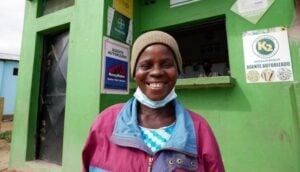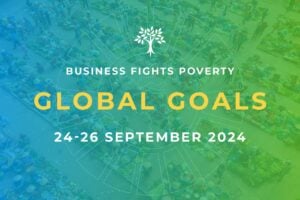Business Fights Poverty continues, as it has done over the past decade, to be the network for the private sector and its partners to unlock new opportunities for social impact.
This work continues at pace and over the past month, not only did we host our annual UN General Assembly side event with 200 professionals from business and the development community (you can watch the videos here), but we have also teamed up with Stanford Social Innovation Review to create a voice for business’ social insight and have seen our Advocacy Partnerships report (launched earlier in 2018) featured in Harvard Business Review’s article exploring: Why Climate Change and Other Global Problems Are Pushing Some Business Leaders to Embrace Regulation.
Most excitingly, we launched four new thought leading papers – exploring important issues ranging from refugees to social innovation and in doing so, we have enabled collaborations with organisations such as BMW Foundation, Cargill, CARE, CEMEX, DFID, League of Intrapreneurs, Mercy Corps, Pearson, UNHCR and many others. Below, you can find a synopsis of each of these papers with links to their full write-ups included, we hope you enjoy them:
How do organisations create the conditions for social intrapreneurs to thrive?
We have been partnering with the brilliant League of Intrapreneurs for some time to better understand the world of social intrapreneurs – those talented individuals working inside organisations who generate and develop innovative ideas for projects with social impact. In our latest report, sponsored by DFID, CEMEX and the BMW Foundation, we took this thinking to the next level. We wanted to know: What conditions do social intrapreneurs need to thrive inside an organisation? What we revealed were four key components businesses need to get right before they can expect real results: Purpose beyond Profit, People as Change Agents, the Power of We (the decentralisation of power and fostering of new types of collaborations) and the Generative Pipeline (investing in and creating structures specifically for intrapreneurship). Click here to find out more and download the report.
What does it take to create a transformational partnership?
This is the question we have been thinking about as we teamed up with multinational corporate, Cargill, and international NGO, CARE, to explore their 50-year partnership and see how it has moved from being philanthropic to one that is now deeply transformational. In our Briefing Paper, we formulate a six-point business case that others wishing to create or sustain their corporate-NGO partnerships can adapt. In the process, we uncovered five success factors that these partnerships should perhaps be considering as they look to deepen their impact: convening around an ambitious shared purpose in a way that drives mutual value; a process that is based on co-creation; and an authentic approach to both internal communication and external communication. Click here to find out more and download the report.
How can business support refugees?
Many companies are interested in supporting the refugee response beyond charitable contributions and look to draw upon their core expertise, resources, and influence with consumers, suppliers, and government. Business Fights Poverty with support from Pearson and in partnership with the UN Refugee Agency (UNHCR), Business Call to Action, Innovest Advisory, Mercy Corps, and Thomson Reuters Foundation set out to fill the gap in understanding – how can businesses better support refugees? The result: a taxonomy of 17 business models, and a series of deep-dive briefs into three of these different business models – digital education for refugee children, buying from refugee-owned or inclusive enterprises, and safe and sustainable off-grid energy solutions. Click here to find out more and download the report.
Are businesses missing opportunities on education and training for sustainable development?
Education is at the heart of human progress and the UN Sustainable Development Goals (SDGs). It enables people to build better lives and equips business and society to address our world’s interconnected issues and opportunities. This report explores how business can help people gain the skills and knowledge to advance sustainable development, navigate the future of work and create a more prosperous society. The consortium of partners, including Pearson, Arizona State University and PRME, an initiative of the United Nations Global Compact shares insights and recommendations for business to promote education and training for sustainable development. Click here to find out more and download the report.










